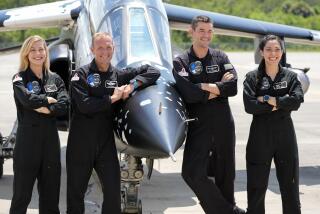Cassini Foes Organize in Effort to Stop Launch
- Share via
CAPE CANAVERAL, Fla. — Bob Whipple has already told his boss he won’t be at work. Maria Telesca-Whipple has rehearsed loading the couple’s two young children and a few belongings into the car. If NASA’s rocket to Saturn blasts off as scheduled Oct. 13, they won’t be here to see it.
“We’re going to Daytona Beach, wherever, until the launch is over,” said Telesca-Whipple, 37. “I don’t think it’s safe. And I’m trying to drill it into the heads of every mother with children that they should leave.”
Fears that a longshot launch-pad explosion could result in a shower of plutonium dust over parts of central Florida have galvanized opposition to the mission and sparked several recent demonstrations outside the gates of the Kennedy Space Center. Another is scheduled Oct. 4.
Officials of NASA and local government insist the project is safe, and add that they have no indication that an exodus of frightened citizens is afoot. Nonetheless, Telesca-Whipple said, “I know 30-40 people who are going to leave.”
Although launches of space shuttles, satellites and exploratory rockets are routine here on what is called the Space Coast, controversy over the seven-year Saturn mission, which carries 72 pounds of radioactive plutonium to power the craft, grows more heated daily.
At a town meeting in Melbourne last week, more than 225 people turned out to hear anti-nuclear activists debate Cassini project manager Richard Spehalski and U.S. Department of Energy physicist Beverly Cook. Anger and concern over the safety of the mission were apparent in many of the questions from the audience.
“What gives the federal government the right to risk our lives like this?” asked Larry Reid of nearby Palm Bay.
Spehalski and Cook insisted that there will be no appreciable threat to human life. “I’m a mother and a grandmother, and my children will be here to watch this launch,” said Cook, the Energy Department’s manager in charge of developing and testing the plutonium fuel generators aboard Cassini. “If I thought there was any risk to human life in Florida, I wouldn’t be a part of this mission.”
But over and over, local residents and activists who have been organizing to stop the launch questioned NASA’s safety record, the value of the mission and the motive of government agencies involved, especially the Pentagon.
“Cassini is a bad seed,” said Bruce Gagnon of the Florida Coalition for Peace and Justice. “The government is hoping to use this mission to get us used to military control of space.”
Among the most poignant expressions of opposition to Cassini came from Bobby C. Billie, the spiritual leader of the Seminole Nation of Florida, who urged mission backers to use the $3.3 billion budgeted for the project to clean up the environment.
“You are not thinking about the future of the people,” Billie said. “Remember, when the first Europeans came here, they trashed the country. Now you are going to trash another planet.”
*
Many at Tuesday’s town meeting took little comfort in assurances from Bob Lay, director of the Brevard County Office of Emergency Management, that in a “worst-case scenario,” only an 11.5-square-mile area within the Kennedy Space Center “could receive plutonium” after an explosion that released radioactive material.
Anti-nuclear organizers estimate that at least 5,000 people will show up outside the gates of the Cape Canaveral Air Station on Oct. 4 to protest the mission. Among those planning to take part is Peg McIntire, an 86-year-old St. Augustine resident who heads Grandmothers for Peace.
Despite having had two hip replacements, McIntire vows to scale a fence if necessary in an attempt to breach the restricted launch pad area. She expects to be arrested.
“I think there is a slight chance of plutonium being dispersed, but more than anything, taking this risk to reach Saturn is immoral,” she said. “Solar energy is being perfected. We can wait and do it safely.”
Mary Beth Murrill, a spokeswoman for the Jet Propulsion Laboratory in Pasadena, said such fears are based on “wild allegations and falsehoods” concerning nuclear fuels. “No one involved with this mission distrusts the safety of it,” said Murrill, who plans to attend the launch with her mother and her children. “I’m fearful that if an accident did occur, people will be so frightened that there will be panic, and there’ll be health effects because of that.”
More to Read
Sign up for Essential California
The most important California stories and recommendations in your inbox every morning.
You may occasionally receive promotional content from the Los Angeles Times.













